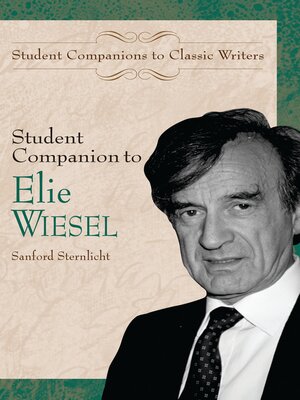Student Companion to Elie Wiesel
ebook ∣ Student Companions to Classic Writers
By Sanford Sternlicht

Sign up to save your library
With an OverDrive account, you can save your favorite libraries for at-a-glance information about availability. Find out more about OverDrive accounts.
Find this title in Libby, the library reading app by OverDrive.



Search for a digital library with this title
Title found at these libraries:
| Library Name | Distance |
|---|---|
| Loading... |
Since it was written nearly 50 years ago, Night (1958) has changed world perception of the Holocaust experience. Wiesel's oeuvre, including Holocaust narratives such as Dawn (1961), novels, essays, tales, and plays, has also altered the critical and aesthetic landscape through which we view literature, placing themes of religious identity, hope, survival, devotion to family, and humanity ahead of distinctions of fiction and nonfiction. This volume offers critical analysis of all of Wiesel's major writings, with full chapters on Night, Dawn, The Oath, and four other full-length works. His most recent five novels, including The Testament (1980) and Twilight (1987), are also covered. Plot, character development, thematic concerns, and style are discussed, as are historical contexts and alternate critical perspectives.
This volume is an indispensable tool for students, whether they are encountering Night for the first time, revisiting Wiesel's literary contributions, or discovering the author's recent works, such as The Judges (1999). A biographical section relates the tragic events of Wiesel's life to his inspirational writings. A literary heritage chapter offers an overview of his achievements and situates his works within the Western literary tradition and the historical and religious frameworks. A separate chapter covers Wiesel's nonfiction writings, including his most important essays, tales, and studies. A bibliography of selected sources is included.
This volume is an indispensable tool for students, whether they are encountering Night for the first time, revisiting Wiesel's literary contributions, or discovering the author's recent works, such as The Judges (1999). A biographical section relates the tragic events of Wiesel's life to his inspirational writings. A literary heritage chapter offers an overview of his achievements and situates his works within the Western literary tradition and the historical and religious frameworks. A separate chapter covers Wiesel's nonfiction writings, including his most important essays, tales, and studies. A bibliography of selected sources is included.







